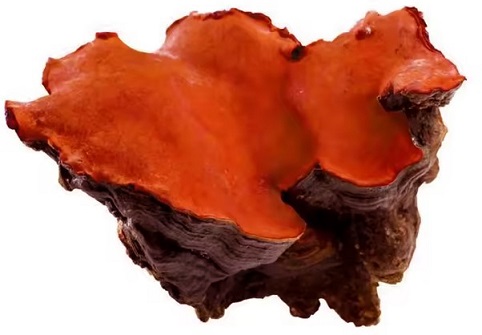Nikhil Prasad Fact checked by:Thailand Medical News Team Nov 20, 2024 4 months, 3 weeks, 4 days, 4 hours, 17 minutes ago
Herbs And Phytochemicals: Researchers from Peking University in China, along with collaborators from institutions such as Xinjiang Medical University, Jinan University, and Shandong University, have discovered that Antrodia cinnamomea triterpenoids (ACT) - bioactive phytochemical compounds found in a medicinal mushroom - can significantly combat cardiac hypertrophy, a dangerous enlargement of the heart. The findings reveal ACT’s potential to improve heart health by targeting key biological mechanisms.
 Medicinal Mushroom Discovery May Aid Heart Health
What Is Cardiac Hypertrophy?
Medicinal Mushroom Discovery May Aid Heart Health
What Is Cardiac Hypertrophy?
Cardiac hypertrophy occurs when the heart muscle thickens due to stressors like high blood pressure or heart failure. While initially an adaptive response, prolonged hypertrophy can lead to severe complications, including heart failure. Researchers worldwide have been searching for effective treatments to reverse or prevent this condition.
This
Herbs And Phytochemicals news report explains how ACT could be the breakthrough scientists and clinicians have been seeking. The mushroom extract, traditionally used in Taiwan for treating ailments like hypertension and liver issues, has shown promise in addressing heart problems.
The Role of ALDH2 and ACT
The study identified aldehyde dehydrogenase 2 (ALDH2), an enzyme crucial for detoxifying harmful substances in the body, as a key mediator of ACT’s effects. ALDH2 is vital for maintaining mitochondrial health and reducing oxidative stress - factors that contribute to cardiac hypertrophy. When ALDH2 activity is impaired, the heart's energy supply becomes inefficient, leading to tissue damage.
Using animal models, the researchers demonstrated that ACT restored ALDH2 expression and function, protecting against heart damage. This effect was notably absent in mice lacking ALDH2, indicating the enzyme's pivotal role in the observed benefits.
Key Findings of the Study
-Heart Protection in Mice Models:
The researchers induced cardiac hypertrophy in mice using angiotensin II and a procedure known as transverse aortic constriction (TAC). ACT treatment significantly reduced heart enlargement, oxidative stress, and signs of mitochondrial dysfunction in normal mice. However, these protective effects were not seen in ALDH2-deficient mice, emphasizing the enzyme’s importance.
-Cellular Evidence:
In lab-grown neonatal cardiac cells, ACT and its active monomer, dehydrosulphurenic acid (DSA), reversed hypertrophy induced by stress hormones. DSA was highlighted as a particularly potent component of ACT, showing similar effects in improving mitochondrial health and reducing cell stress.
Mechanism of Action:
Advanced techniques like protein microarray analysis revealed that DSA interacts with SNW1, a transcriptional coactivator. SNW1 enhances the expression of ALDH2 by cooperating with
retinoid X receptors (RXRs). This interaction boosts ALDH2 activity, creating a protective feedback loop against heart stress.
Oxidative Stress and Mitochondrial Health:
Oxidative stress, caused by harmful by-products of metabolism, was significantly reduced in the ACT-treated groups. Additionally, ACT improved the balance of mitochondrial fusion and fission, processes essential for cellular energy and health. The mushroom extract facilitated the repair and maintenance of damaged mitochondria, ensuring better heart function.
Implications for Treatment
These results position ACT as a promising natural compound for managing and potentially reversing cardiac hypertrophy. Unlike synthetic drugs, ACT offers a natural approach with minimal side effects, making it an attractive candidate for broader clinical trials. By targeting the root causes of heart muscle thickening - oxidative stress and mitochondrial dysfunction - ACT could revolutionize how we approach cardiovascular health.
Broader Context of ACT
Antrodia cinnamomea, often referred to as the "king of medicinal mushrooms," has long been prized in traditional medicine. Its extracts have shown anti-inflammatory, antioxidant, and liver-protective properties. This research extends its benefits to heart health, underscoring its versatility and potential.
Conclusion
The findings from this study mark a significant step forward in cardiovascular research. By identifying ACT’s ability to upregulate ALDH2 and improve mitochondrial health, scientists have uncovered a new avenue for treating cardiac hypertrophy. Future studies will focus on validating these results in human trials and refining the compounds for medical use.
The study findings were published in the peer-reviewed journal: Redox Biology.
https://www.sciencedirect.com/science/article/pii/S2213231724004154
For the latest on
Herbs And Phytochemicals, keep on logging to Thailand Medical News.
Read Also:
https://www.thailandmedical.news/news/covid-19-news-groundbreaking-taiwanese-research-suggests-phytochemicals-from-antrodia-cinnamomea-as-a-promising-solution-for-covid-19
https://www.thailandmedical.news/news/health-news-mushrooms-a-potential-ally-in-hypertension-management
https://www.thailandmedical.news/news/reishi-mushroom-powder-is-an-effective-treatment-for-mouth-ulcers
https://www.thailandmedical.news/news/medical-study-links-mushroom-consumption-with-lower-risk-of-prostate-cancer
https://www.thailandmedical.news/news/penn-state-college-of-medicine-study-shows-that-the-phytochemical-ergothioneine-found-in-most-edible-mushrooms-lowers-risk-of-depression
https://www.thailandmedical.news/news/danish-study-shows-that-regular-low-doses-of-psilocybin-can-help-with-mental-health-disorders
https://www.thailandmedical.news/news/shictin-a-novel-lectin-from-shiitake-mushrooms-shows-promise-in-combating-covid-19-omicron-variant
https://www.thailandmedical.news/news/cordyceps-polysaccharides-for-immunity-enhancement
